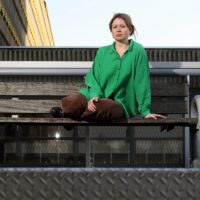What you know before you know you know it
Intuition plays a major role in all scientific progress, writes Jenna Pfeifer, but you cannot rely on it blindly. We must therefore use it wisely.
Intuition plays a major role in all scientific progress, writes Jenna Pfeifer, but you cannot rely on it blindly. We must therefore use it wisely.

(Photo: Sam Rentmeester)
TU Delft is a technical university, full of technical types, so you’d think most research here is driven by carefully thought-out rationale and hard facts. But there is something underlying all scientific progress that is often overlooked – intuition.
Ask someone to describe intuition, and you’re likely to get a long pause. That’s because intuition happens fast, without deliberation, and we are left trying to find words for something that sidesteps language entirely. Still, here’s what people told me:
“When I was a nurse, I just knew when a patient was about to die.”
“I get a feeling when my sourdough starter needs feeding.”
“Sometimes I solve a tough coding problem, but I couldn’t tell you how.”
Intuition is a visceral sense. Something feels off or it feels right, even when you can’t articulate why. How does it work? Your brain resides in the darkness of your skull. It cannot observe the world directly, all it can do is make predictions based on the signals it receives and prior experiences.
Intuition is thus the brain’s ability to recognise patterns before we consciously register them. Over time, repeated exposure to similar patterns sharpens our intuitive sense. Nurses perceive minor changes in the rise and fall of a chest. Arborists pick out tree branch structures that could indicate disease. Gymnasts know exactly where to place their feet on a narrow beam.
Eric Hoel, in his Substack essay Great scientists follow intuition and beauty, not rationality, argues that scientific breakthroughs often begin with ‘pre-scientific’ intuition. Rational thought is slow and intentional, while intuition, by contrast, can leap forward in seconds.
How do we learn when not to trust our intuition?
As Hoel puts it, we often use logic to justify insights we arrived at intuitively. TU Delft’s own design research reflects this. For students, a logical, structured approach enhances confidence and evaluative quality, but only when followed by an intuitive one.
Then again, not all hunches are helpful. Even great scientists can both hit and miss. Fred Hoyle had the strong – and correct – intuition that the sun plays a key role in nuclear fusion. But he also wrongly believed that influenza originated from space.
In The Intuition Toolkit, Joel Pearson warns against ‘misintuitions’, feelings that lead us astray like cognitive biases, paranoia, or false pattern recognition. Take pilots, for example. During a sudden transition from climbing to level flight, the inner ear can give a signal that you’re tumbling backward, a phenomenon known as the inversion illusion. Pilots are trained to ignore their instincts and trust their instruments on these occasions.
In a study conducted in my research team, we found many participants misclassified real images of futuristic cars and buildings as AI-generated, and a handful claimed this was down to ‘intuition’, suggesting that this sense is shaped more by familiarity than by actual markers of authenticity.
This seems worrying, so how to move beyond it? How do we learn when not to trust our intuition? That’s where education comes in. We should not discard intuition, we need to teach people how to use it wisely. Learn the cues i.e. the dashed line signalling ChatGPT’s output. Reflect on hits and misses. Understand when to follow the hunch, and when to reach for the data.
After all intuition, when honed, doesn’t replace reason, it works with it. It’s fast, experiential, embodied. It learns not just from data, but from doing. And that’s something even the smartest algorithm cannot grasp. Yet …?
Jenna Pfeifer is a PhD student in Biomechanical Engineering and Cognitive robotics, Faculty of Mechanical Engineering. Her research focuses on the Effects of Technology on Youth Loneliness. Jenna writes to understand the world better by attempting to merge two perspectives: the scientific and the poetic.
Comments are closed.